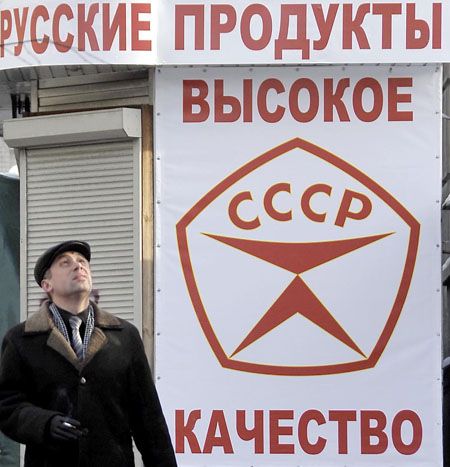“Trade wars” as a test for Ukraine’s political independence
Experts believe that Ukraine’s sanitary service will not allow itself to be drawn into the Russian-American dispute
The “meat war” between Russia and the United States looks like an act of political retribution, and the Kremlin wants to drag Ukraine into it. These are the findings that experts made following the head of the Russian Federal Service for Veterinary and Phytosanitary Surveillance (Rosselkhoznadzor) Sergey Dankvert’s meeting with Deputy Minister of Agrarian Policy and Food of Ukraine Ivan Bisiuk, held on February 4 in Moscow.
Deputy General Director of the Ukrainian Agrarian Confederation Oleksandr Yaroslavsky told The Day: “Given the history of trade ‘showdowns’ between Russia on the one hand and Belarus, Georgia, and the US on the other, one has ample reason to see political motive behind this latest spat.” According to the expert, Russia’s desire to protect the domestic producers is the most likely explanation of its bellicosity. “When Russia joined the WTO, import barriers went down. However, they still have a lever in non-tariff import regulations, and these are the tools which they are actually using now and will use in the future, in my opinion,” the expert said.
Yaroslavsky sees this very circumstance as the reason why the Ukrainian side is unlikely to follow the neighbor’s “kind advice.” “We have our own veterinary service, which is in charge of overseeing the importation of meat. It is this service’s job to determine whether this or that product may enter the territory of Ukraine or not, their American, Russian or Belarusian colleagues have nothing to do with that, and it is our service that is responsible,” Yaroslavsky said.
Should the unlikely event of Ukraine’s entry into the “meat war” still happen, our authority predicts the Ukrainian consumers shall be ready for higher prices of meat and meat products. “Should it still come to this [i.e., import ban on American pork and beef. – Author], then it would obviously cut the importers’ share of the market and might cause price of those products that are made of imported meat to go up, I mean mostly various sausages. It is also surely possible that such a situation would force domestic meat prices to go up, too, just because there would be less of meat on the market, which obviously would make it more expensive,” the expert predicts.
Let us recall that the press service of the Rosselkhoznadzor reported that the Moscow meeting’s participants discussed the prospects for trade relations with countries that use ractopamine, a productivity stimulant. This drug is fed to cattle and pigs to accelerate their muscle mass gains. Besides its just described pharmacological effect, ractopamine can have toxic effects, therefore consumption of meat and meat offal of ractopamine-treated animals by humans can cause poisoning, which manifests itself in various clinical signs, including tachycardia and other cardiac arrhythmias, tremors, headaches, muscle spasms, and increased blood pressure.
Let us recall that beginning with February 11, Russia will label US pork and beef as high-risk products and ban them from the nation’s territory. Ukraine’s eastern neighbor warns it that American producers will then try to redirect their export flows to the Ukrainian market. The Russian representatives call on Ukraine to prevent it from happening, because, despite the Rosselkhoznadzor’s repeated requests, the Americans have not provided guarantees that products of animal origin, which are supplied to the Russian market, will be free from the ractopamine beta-agonist. “Out of the four countries that are using massive quantities of ractopamine in animal feeding (the USA, Canada, Mexico, Brazil), only the USA has not offered a constructive response to our demands. Unfortunately, the competent authorities of the United States declined to discuss the issue in a professional manner, and the American administration attempted to label our demands politically motivated, to link them with the Magnitsky List, and make unfounded accusations of alleged violations of the WTO principles by Russia,” the statement reads. According to the Western media, the Rosselkhoznadzor’s statement appeared the day after the US Senate passed the Magnitsky Act which introduced certain restrictions on American activities of some Russian officials.
Remarkably, immediately before declaring the “meat war” on the United States, Russia announced that imports of Georgian wine and mineral water will be resumed. The permanent “herald” of Russia’s trade conflicts, its chief sanitary doctor Gennady Onishchenko responded to the head of the National Wine Agency of Georgia Levan Davitashvili’s statement that Georgian products may return to Russian stores as soon as in spring 2013 with optimistical assurances: “In my opinion, it can come even sooner.” Interestingly, he was as confident and categorical in spring 2006, too, when assuring the Russian consumer that Georgian products contained high levels of pesticides [in wine. – Author] and were substandard according to the Russian quality requirements [in the case of mineral water. – Author]. Interestingly, Russia accounted for about 80 percent of Georgian wine exports, making for about 10 percent of the Russian market, and 35 percent of Georgian Borjomi mineral water exports before the ban. It is thus obvious that the attack was strong and hit its target.
The trade war is a traditional tool of political manipulation for the Russian government. Having exhausted its patience for dialogue and failed to change the opponent’s stance, it closes the border. Of course, it was clearly shown by the latest episodes in Ukrainian-Russian relations, including the Russians’ distaste for our cheese, introduction of scrappage duty on imported cars, prospective conflict on the sugar market of the Commonwealth of Independent States, Russia’s threats against Ukrainian brewers, and the Customs Union’s member nations’ sudden dislike for Ukrainian confectionery...
Going back to the beginning of this article, we shall note that it looks like Russia has slightly changed its trade war tactics. What are the chances that Ukraine will swallow the bait? Should it do so, would it mean that Russia has a huge influence, particularly on the formation of Ukraine’s international trade policy?






